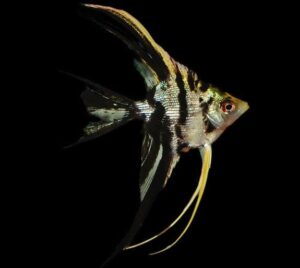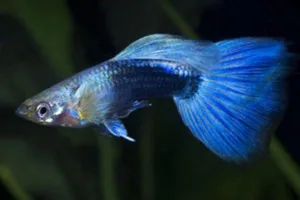Guppies (Poecilia reticulata) are among the most beloved and commonly kept aquarium fish in the world, admired for their vibrant colors and ease of care. However, when it comes to their temperament, the question that often arises is, “Are guppies aggressive?” In this article, we will delve into the complex nature of guppy behavior, addressing this question while providing valuable insights for aquarists and guppy enthusiasts.
The Varied Personalities of Guppies
Understanding Guppy Behavior
Guppies exhibit a wide range of behaviors, and their level of aggression can vary significantly from one individual to another. It’s essential to recognize that guppies have unique personalities, and their interactions with tankmates can differ. Several factors contribute to this variation:
1. Gender Matters
Guppy aggression is frequently linked to gender. Male guppies, with their striking colors and elaborate tails, are often more territorial and aggressive than females. This aggression primarily stems from competition for mating opportunities. Male guppies will display intense territorial behavior, chasing away other males in their quest to win the favor of females.
2. Space and Territories
Like many other aquarium fish, guppies can be territorial. Providing ample hiding spots, plants, or structures in your aquarium can help reduce aggressive encounters. Guppies are less aggressive when they have defined territories and places to escape to if conflicts arise.
3. Tank Size and Population Density
Tank size plays a crucial role in determining guppy aggression. In smaller tanks with high population densities, aggression tends to be more common. Overcrowding can lead to increased competition for resources and space, which may result in aggressive behaviors. If you’re concerned about guppy aggression, consider maintaining a lower population density or providing a larger tank.
Common Aggressive Behaviors
Identifying Aggressive Actions
Guppy aggression typically manifests in several ways, and recognizing these behaviors can help you address any issues in your aquarium:
1. Chasing and Nipping
One of the most common forms of guppy aggression is chasing and nipping. Male guppies, in particular, engage in territorial disputes and often chase and nip at other males. This can lead to stressed and injured tankmates, so it’s essential to monitor for such behaviors.
2. Fin Nipping
Guppies, especially males, are known to nip at the fins of other fish. This can lead to torn fins, which may create stress and make the victim more susceptible to diseases. If you notice fin damage in your guppy tank, it’s crucial to address the issue promptly.
3. Aggressive Displays
Aggressive guppies may display flared fins, erect dorsal fins, and darkened coloration. These displays are often meant to intimidate rivals and assert dominance. These visual cues can help you identify aggression in your aquarium.
Mitigating Guppy Aggression
Strategies for Peaceful Coexistence
To maintain a harmonious guppy tank, there are several strategies you can employ to reduce aggression:
1. Balanced Gender Ratio
Maintaining an appropriate gender ratio is essential to minimize male-male aggression. A recommended ratio is one male guppy to every two or three female guppies. This reduces the competition for females and helps spread out aggressive behaviors.
2. Sufficient Hiding Places
Providing hiding spots, such as plants, caves, and decorations, can help reduce aggression by offering refuge for submissive guppies. When chased, guppies can find shelter, decreasing the likelihood of injuries. The 5 Best plants for your guppy fish tank
3. Bigger Tanks How to Set Up a Guppy Fish Tank
Opt for a larger aquarium if possible, as this can alleviate overcrowding and reduce territorial disputes. A well-sized tank allows guppies to establish territories without constant conflicts. Guppy Fish Tank Decorations
4. Observe and Isolate
Regular observation of your guppies is crucial. If you notice aggressive individuals causing harm to others, consider isolating them in a separate tank for a period to minimize stress and allow victims to recover.
Are There Exceptions?
Unusual Cases of Aggressive Guppies
While guppy aggression is often related to breeding and territory, some individuals may display aggression without an apparent reason. These exceptions can challenge the typical understanding of guppy behavior.
1. Genetic Factors
In rare cases, some guppies may have genetic predispositions for aggression. If you encounter unusually aggressive guppies, it might be worth considering their genetic background and selectively breeding for calmer traits.
2. Stress and Health Issues
Sometimes, aggression in guppies can result from underlying stress or health problems. Check for water quality issues, inadequate nutrition, or other factors that may contribute to stress in your aquarium.
Conclusion
In the realm of aquarium keeping, guppies are renowned for their beauty, adaptability, and captivating behaviors. While they are generally considered peaceful, the question, “Are guppies aggressive?” reveals the nuances of their temperament. Understanding the factors that influence guppy aggression and employing strategies to mitigate it are vital for ensuring a harmonious and healthy aquatic environment for these remarkable fish.
In the end, guppy aggression is a manageable aspect of their behavior. By observing, learning, and implementing the tips provided in this article, aquarists can enjoy the vibrant world of guppies while maintaining a peaceful coexistence in their aquariums.











